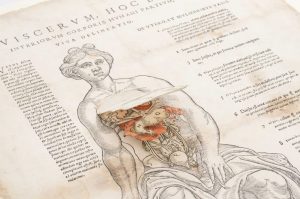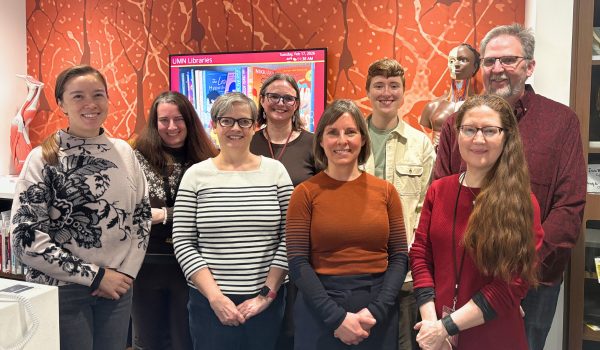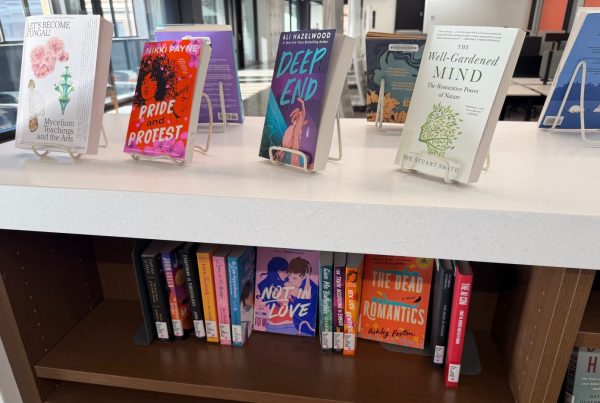
Nicolini da Sabbio, G. A. (1539). Viscerum hoc est interiorum corporis humani partium. per Ioan. Ant. de Nicolinis de Sabio, expensis uetro Io. Baptistae Pederzani. Wangensteen Historical Library of Biology and Medicine.
MINNEAPOLIS, MN, January 14, 2025 — The Wangensteen Historical Library of Biology and Medicine (WHL) and Digital Library Services (DLS) at the University of Minnesota Libraries have been awarded a $100,000 National Endowment for the Humanities Research and Development Grant. The grant will allow for the development of a workflow to digitize and host interactive flap books in online digital collections environments.
The project — led by principal Investigators Emily Beck (Associate Curator, WHL), Theresa Berger, (Head of DLS), and Lois Hendrickson (Curator, WHL) — will draw from WHL’s extensive collection of 16th-20th century flap anatomies to create a digitization workflow and pilot a hosting platform that centers user experience and prioritizes interactivity in digital collections.
“This is an incredible opportunity to provide greater access to some of the Wangensteen’s most valued materials as well as develop a system for ongoing digitization,” explains Beck. “Because of the ways they were constructed as interactive objects, flap anatomies are both very fragile and extremely challenging to digitize.”
For more information
Please contact Theresa Berger (theberg@umn.edu) or Emily Beck (ebeck@umn.edu)
Beck said that the goal of this project is to create a method of digitizing that will prioritize interactivity, a more true-to-life experience of the objects as well as prioritize ongoing preservation of materials that are too fragile to be handled frequently.
“We already use these materials in teaching and research, supporting courses that examine histories of health and art history and researchers who study how people learned and communicated about the body in the past,” Beck said. “We’re excited to be able to extend the reach of these materials in different ways — from ensuring that students who can’t come to campus can interact with them to giving researchers ways of accurately comparing our flap anatomies with those in other cultural heritage institutions.”
The NEH received 33 eligible applications, and the UMN Libraries is one of 6 awardees this cycle. The title of the project is: “Making Meaning from Movement: Piloting a Digital Workflow for Interactive Flap Books.”
In addition to developing workflows for capturing fragile flap materials, the project will also pilot a hosting platform that allows users to “move” through flap books as if they were turning the flaps themselves.
“There is real possibility to push boundaries and explore new ground in digital collections,” explains Berger. “Most digitization and presentation work relies on a 1-to-1 presentation method — one photograph per page, with users clicking a button to load or ‘turn’ the next page. Instead, this project proposes having several photographs for all of the flaps on a single digital page, and developing a method for users to move through those flaps with features that mimic the physical turning or revealing of the flaps to show what is underneath. This would be a new way of experiencing digital surrogates and thinking about digitization in cultural heritage.”
A multidisciplinary project team
In response to the deep subject-matter and technical expertise required, the PI’s have assembled a multidisciplinary project team made up of software developers, animation experts, and digital photographers. Regular consultation by digital humanists, flapbook scholars, and historians will also inform the direction of the online platform’s user interface.
This award builds on a 2024 University of Minnesota Institute for Advanced Study Incubator Grant awarded to interdisciplinary teams exploring new initiatives as they seek external funding and clarifying project ideas. “This initial grant was essential, allowing the team to broaden the scope of the project and consider potential solutions and potential partners,” said Lois Hendrickson.
This project will be administratively housed in the University of Minnesota’s Institute for Advanced Study, a systemwide University hub for interdisciplinary collaboration, which reports to the executive vice president and provost.
About the University of Minnesota Libraries
The University of Minnesota Libraries expands access to information, strengthens research and teaching, and enriches communities throughout Minnesota, the region, and the world. Its Wangensteen Historical Library of Biology and Medicine holds materials and objects that broadly represent health, medicine, and biological sciences from 1430 to 1945. The UMN Libraries’ Digital Library Services specializes in archival and special collections digitization for collections across the University of Minnesota system. Digitized items are uploaded to UMedia, a free, open-access digital repository designed to promote use of materials by staff, students, and the general public.
About the Institute for Advanced Study
The University of Minnesota’s Institute for Advanced Study is a systemwide unit of the Office of the Executive Vice President and Provost at the University of Minnesota. We invest in people and incubate projects, build interdisciplinary networks across the University and beyond, advance critical conversations, and are committed to building a just University together. Visit ias.umn.edu.
About the National Endowment for the Humanities
NEH is the nation’s largest public funder of the humanities, which include history, philosophy, literature, language, ethics, law, archaeology, political theory, comparative religion, anthropology, sociology, and media and cultural studies.
For questions, please contact Theresa Berger (theberg@umn.edu) or Emily Beck (ebeck@umn.edu)




